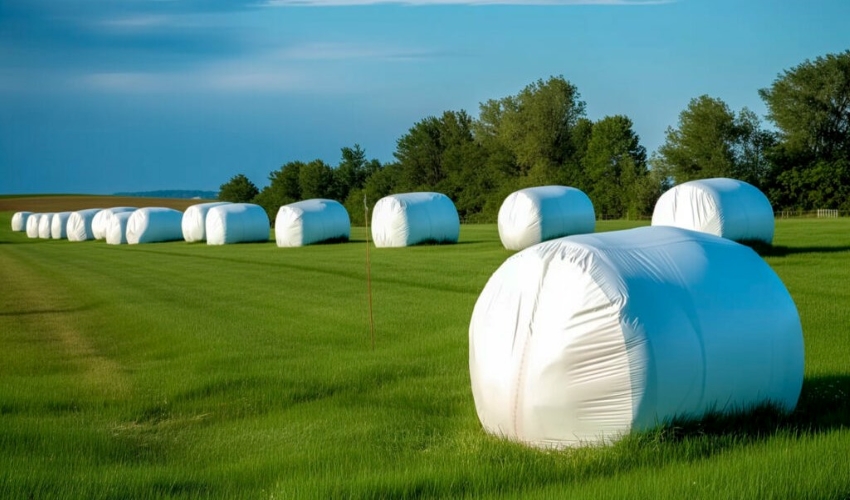
Bale silage stretch film is a crucial agricultural product designed to protect and preserve silage, ensuring that farmers can store high-quality forage for extended periods. This specialized film helps create an airtight seal around silage bales, preventing oxygen exposure, which can lead to spoilage. Products like bundling stretch film can also be used in conjunction with bale silage stretch film for securing smaller bales or additional packaging needs, offering versatility in farm operations. By using bale silage stretch film, farmers can significantly reduce the risk of mold growth and nutrient loss in their stored forage, maintaining the overall quality of the feed. Effective silage wrapping with PWP Stretch Film not only preserves forage but also helps in optimizing animal nutrition, supporting healthier livestock, and improving farm efficiency. Its UV protection and tear resistance make it a reliable choice for long-term storage. Bale silage stretch film provides strong protection, excellent puncture resistance, airtight adhesion, and reduces spoilage, even in extreme climates.
Why Choose Our Stretch Film Over Competitors?
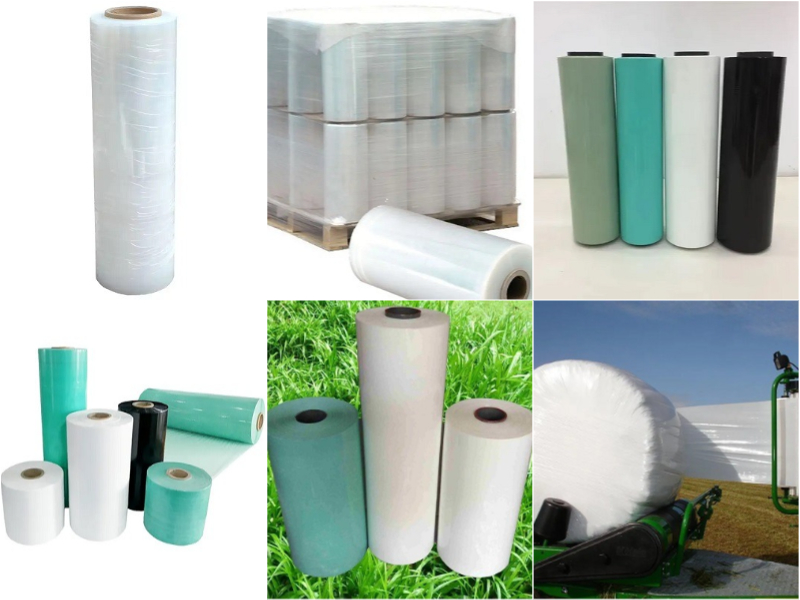
| Attributes | Details |
|---|---|
| Place of Origin | Fujian, China |
| Brand Name | PWP Stretch Film |
| Product Name | Bale Silage Stretch Film |
| Material | Polyethylene |
| Features | Moisture-proof, Waterproof |
| Hardness | Soft |
| Processing Type | Multiple Extrusion, Casting, Blow Molding |
| Transparency | Opaque |
| Color | Customized |
| Thickness | Customized |
| Length | Customized |
| Width | Customized |
| Size | Customized |
| Printing Process | Gravure Printing |
| Logo | Print Customer Logo |
| OEM | Avaliable |
| Certificate | ISO, MSDS |
| Industrial Use | Agriculture |
| Advantages | Anti-UV, Anti-puncture and Anti-tear |
| Selling Unit | Single Item |
Bale silage stretch film is a specialized plastic film used in agricultural settings to wrap silage bales, preserving the forage by protecting it from external elements. This film creates an airtight seal around the bales, preventing oxygen from entering, which is essential for maintaining the quality of the silage. Oxygen exposure can lead to spoilage and nutrient degradation, which affects the overall nutritional value of the stored forage. By using bale silage wrapsilage stretch film, farmers ensure that their silage remains fresh, nutrient-rich, and suitable for feeding livestock over an extended period.
One of the key features of bale silage stretch film is its ability to stretch and conform tightly around bales, which helps to create a snug, secure wrap. Its elasticity allows the film to stretch up to 200-300%, ensuring that it adheres properly to the bale while maintaining a strong seal. This feature is particularly advantageous when dealing with irregular shapes or tasks such as pallet wrapping round objects, where achieving a tight and secure wrap is essential for stability. In addition to stretchability, the film offers UV protection, which prevents degradation caused by prolonged exposure to sunlight, making it ideal for outdoor storage.
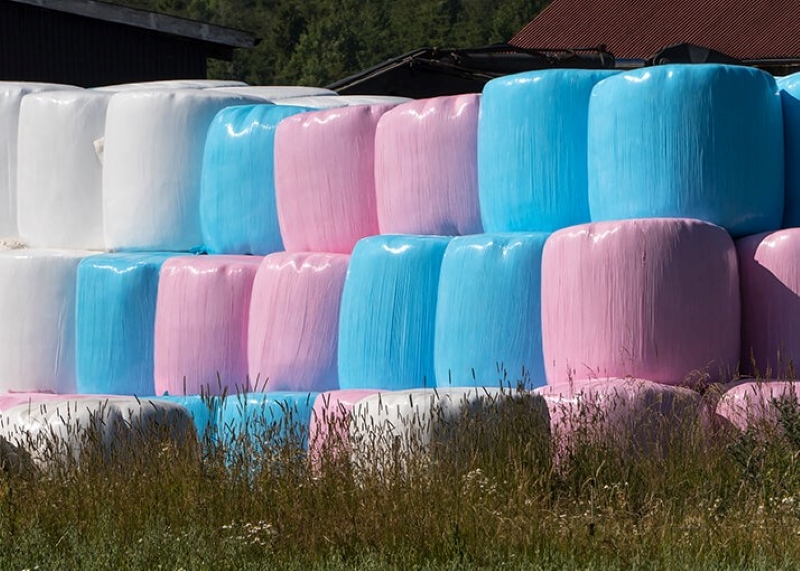
Bale silage stretch film is also highly resistant to tearing and punctures, providing a durable protective layer even in rough handling or during transportation. Its moisture barrier properties further ensure that the silage remains dry, preventing mold growth and spoilage. With brands like PWP Stretch Film, farmers can trust that the bales will stay in optimal condition throughout the storage period, offering superior feed quality for their livestock.
The price of bale silage stretch film can vary based on several important factors, including material quality, size, thickness, and the brand. Understanding these variables can help farmers make informed decisions when purchasing agriculture silage stretch film to meet their specific needs.
One of the main factors influencing the cost of bale silage stretch film is the material quality. High-quality films, like PWP Stretch Film, are typically more expensive due to their superior durability, UV resistance, and stretchability. These films are designed to provide a stronger and more effective seal around silage bales, which helps protect the forage from oxygen exposure, moisture, and other environmental factors. Investing in a higher-quality film ensures longer-lasting protection and a reduction in spoilage rates, which ultimately saves money in the long run.
Another key factor is the size and thickness of the bale silage stretch film. Stretch film sizes vary, with common options being 30 x 5000 or 1 mil 20 x 6000 per roll. Thicker films, such as 1.2 mil or 1.5 mil, offer additional strength and resistance to tears and punctures. However, these thicker films tend to cost more. Farmers with larger operations or those working in harsher climates may benefit from investing in thicker films, as they provide better protection against the elements. Thinner films may be more affordable but may not offer the same level of durability, making them a less ideal option for long-term storage or in environments prone to extreme weather.
The amount of film needed also affects the overall cost. For instance, wrapping larger silage bales requires more material, which increases the total cost. Additionally, the total number of bales being wrapped will dictate how much film is required, meaning farmers with larger herds or more extensive silage storage needs may have to budget for more rolls of film each season.
Bale silage stretch film is available in different price ranges depending on the brand and specific product features. Some brands, such as PWP Stretch Film, offer premium quality films known for their superior tear resistance, elasticity, and UV protection, which tend to be on the higher end of the pricing scale. These films are especially suited for farmers who need reliable, long-lasting wrap for their bales, as they ensure minimal spoilage and preserve the quality of silage for longer periods.
On the other hand, there are more economical options available, such as films with standard thickness and fewer features. These are generally priced lower but may not offer the same level of protection against punctures or UV damage. For farmers in milder climates or with short-term storage needs, these films may suffice, but they may not provide the same cost-saving benefits as premium films over time.
It offers good UV protection and decent tear resistance at a more affordable price than some higher-end products. However, it may not provide the same long-term benefits as thicker, more durable options like those from PWP Stretch Film.
Despite the upfront costs associated with bale silage stretch film, it is considered a cost-effective solution for farmers looking to protect their silage. The film helps reduce spoilage and preserves the nutritional content of the silage, which directly impacts livestock health and farm productivity. By minimizing losses from mold and oxidation, farmers can maximize the amount of feed available for their herds, reducing the need to purchase additional feed.
When choosing a bale silage stretch film, it is essential to consider not only the initial price but also the long-term benefits. Higher-quality films may have a higher upfront cost, but their superior durability and protective features can lead to significant savings by reducing the need for rewrapping and preventing feed loss. For example, a thicker film with enhanced UV protection may cost more initially, but its ability to last through harsh weather conditions can result in lower replacement costs and better-preserved silage.
In addition, using agri stretch silage film can help streamline farming operations by reducing labor costs. Since the film is self-adhesive and easy to apply, farmers can save time and effort when wrapping their bales. This efficiency translates to lower labor expenses, especially for large-scale farms where hundreds or thousands of bales may need wrapping each season.
Bale silage stretch film offers a cost-effective way to protect silage, improve farm productivity, and save money in the long term. By selecting the right film based on quality, size, and thickness, farmers can ensure they are getting the best value for their investment while maintaining the health and well-being of their livestock.
Purchasing bale silage stretch film is an important decision for farmers looking to protect their silage and ensure quality feed for their livestock. There are a variety of options available for buying bale silage stretch film, from local distributors to online retailers and agricultural supply stores. Each option comes with its own set of benefits, and understanding where to buy the right product for your needs can make a significant difference in the performance and longevity of your silage wrap.
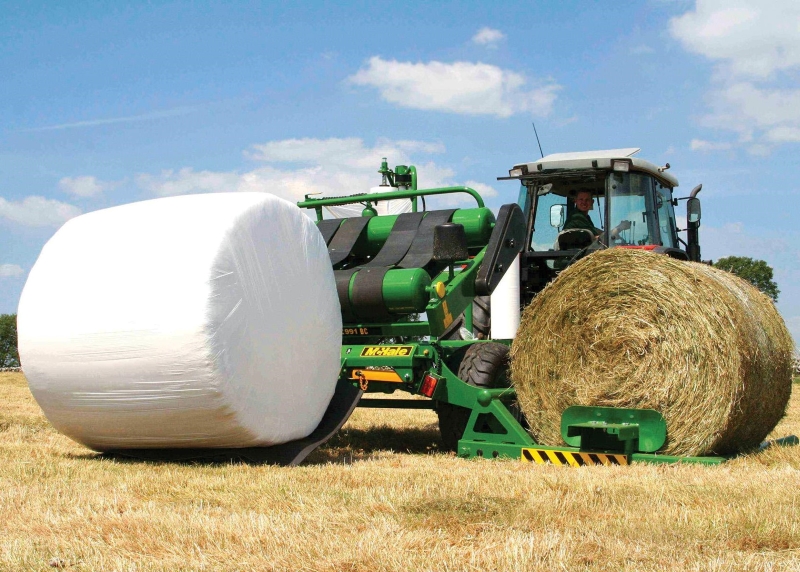
One of the most convenient places to buy bale silage stretch film is through local distributors and agricultural supply stores. These stores often carry a wide selection of agri stretch films, including popular brands like PWP Stretch Film, which are well-known for their durability and UV protection. By purchasing from a local distributor, you have the advantage of speaking with knowledgeable staff who can provide recommendations based on your specific farm needs, such as climate conditions, bale size, and storage requirements.
Local suppliers also allow for quick and easy access to the product, which is especially beneficial when you need a last-minute purchase or require additional rolls during the silage wrapping season. Some distributors may even offer delivery services to nearby farms, saving time and effort. Additionally, purchasing locally allows farmers to build relationships with distributors, potentially leading to bulk discounts or special offers on future purchases.
With the rise of e-commerce, many farmers are turning to online retailers to purchase bale silage stretch film. Shopping online offers a broader range of options, including different sizes, thicknesses, and brands of bale silage stretch film, making it easier to find the perfect product for your specific requirements. Online platforms also provide the convenience of comparing prices, reading product reviews, and learning more about the film’s features before making a decision.
Popular online marketplaces and agricultural supply websites often carry bale silage stretch film from trusted brands like PWP Stretch Film, and many offer fast shipping options to ensure that your order arrives in time for your wrapping needs. One major advantage of buying online is the ability to access products that may not be available in your local area, giving you access to a wider selection of films with various features, such as enhanced UV protection or extra tear resistance.
When purchasing bale silage stretch film online, it’s important to check the product specifications carefully, as not all films are created equal. Ensure that the film you choose matches the required thickness and size for your bale wrapping machine, and look for films with good reviews from other farmers in similar environments. Additionally, make sure to factor in shipping costs, which can sometimes add to the overall price when ordering in bulk.
Whether you’re buying locally or online, there are several key factors to keep in mind when purchasing bale silage stretch film:
There are numerous platforms where you can purchase bale silage stretch film, both online and through physical retailers. Some well-known agricultural supply stores offer a range of silage wrapping products, including PWP Stretch Film, which is highly regarded for its performance and reliability. Additionally, many online agricultural suppliers provide easy access to a variety of bale silage stretch films, allowing farmers to choose the best product for their specific needs.
When buying from online platforms, ensure that the seller has a good reputation and provides detailed product descriptions. Reading reviews from other farmers can also give you insight into the quality and performance of the product. Some online retailers also offer subscription services for recurring orders, which can be a convenient option for large farms that require regular restocking of silage wrap.
Whether you choose to buy from local distributors or online retailers, it’s essential to consider the factors that impact the performance and cost of bale silage stretch film. By understanding your needs, comparing options, and taking advantage of discounts, you can make an informed decision that ensures your silage stays protected and maintains its quality throughout the storage period.
When it comes to finding bale silage stretch film for sale, farmers have a variety of options to explore. Whether you’re looking for premium quality film or more cost-effective options, there are numerous sales, promotions, and bulk purchase opportunities that can help save money while still ensuring you receive a high-quality product. From seasonal discounts to buying in bulk from local suppliers or manufacturers, taking advantage of these opportunities can significantly reduce the overall cost of wrapping silage bales while maintaining the durability and reliability of the film.
Throughout the year, many suppliers and manufacturers offer sales and discounts on bale silage stretch film, particularly during peak seasons. These promotions often coincide with harvest time, as farmers are preparing to wrap their silage bales for storage. It’s common to find sales around the spring and summer months, when wrapping is most active, but discounts can also be available during the offseason to help farmers prepare in advance.
Manufacturers and distributors may offer promotional deals on bale silage stretch film in various forms, including percentage discounts on bulk orders, reduced pricing on specific sizes and thicknesses, or bundled offers. For instance, some suppliers may offer discounts when purchasing multiple rolls, allowing farmers to stock up on enough film to last the entire wrapping season at a reduced cost. Additionally, buying from recognized brands like PWP Stretch Film, which often runs promotions, can provide the assurance of receiving a product known for its superior tear resistance, UV protection, and long-lasting durability.
Another way to take advantage of savings is by signing up for newsletters or loyalty programs from agricultural suppliers or local retailers. These programs often provide exclusive access to sales, early notifications about promotions, and even personalized discounts based on your past purchases. Some brands may also offer limited-time deals or flash sales, which can provide significant discounts on bale silage stretch film for a short period.
Local suppliers and manufacturers are a great resource when looking for bale silage stretch film for sale. Many of these suppliers offer competitive pricing, particularly when purchasing in bulk. Establishing a relationship with your local distributor can also lead to personalized pricing, as they may be willing to offer bulk discounts or negotiate pricing for repeat customers or large orders.
Bulk purchasing is one of the most effective ways to save money on bale silage stretch film. Suppliers are often more willing to offer discounts when farmers commit to buying larger quantities, as it reduces the frequency of smaller orders and ensures steady business for the distributor. Whether you need a few rolls or an entire pallet, bulk purchasing can lead to significant savings in the long term. For example, purchasing 24 rolls of PWP Stretch Film may come with a discount per roll, helping to reduce the overall cost of protecting your silage.
Local suppliers also offer the advantage of faster delivery times, especially if you’re located near a distributor or manufacturer. This can be a crucial benefit during the wrapping season when having quick access to additional film is necessary to prevent delays. In many cases, local suppliers may also offer delivery services or allow farmers to pick up their orders, saving both time and shipping costs.
Additionally, some local manufacturers of bale silage stretch film offer customized solutions based on the specific needs of your farm. They may be able to recommend the best size, thickness, or UV protection level for your region’s climate, which ensures you are getting a film that offers optimal performance. By purchasing directly from a manufacturer, farmers may also benefit from factory-direct pricing, cutting out the middleman and reducing costs.
In addition to local suppliers, many online retailers provide a wide variety of bale silage stretch film for sale. Online platforms allow farmers to browse a diverse selection of films from different brands, thicknesses, and sizes, often with competitive pricing. Many online retailers offer seasonal discounts or clearance sales on specific products, which can be particularly beneficial if you’re looking to try a new brand or stock up for future use.
Online shopping also allows you to easily compare prices across different suppliers, helping you find the best deals on bale silage stretch film. Some retailers may offer free shipping for bulk orders, or discounts on specific sizes, which can add to your savings. By checking multiple platforms and reading product reviews, farmers can ensure they are purchasing a quality product while taking advantage of the best possible pricing.
When shopping for bale silage stretch film online, it’s important to pay attention to the specifications of the film, such as thickness and stretchability, as well as the shipping costs and delivery times. While online purchases offer convenience, ensuring timely delivery is critical, especially during the busy wrapping season. Be sure to check for any current promotions that might provide free or reduced shipping, particularly for large orders.
For farmers who wrap a large number of silage bales each year, bulk purchasing bale silage stretch film is a smart strategy. By buying in bulk, you not only save on the price per roll, but you also ensure you have enough film on hand to complete your wrapping tasks without interruption. This can be especially important during peak seasons when running out of film could delay wrapping, affecting the quality of the silage.
When buying in bulk, consider the storage space available on your farm, as rolls of bale silage stretch film should be stored in a cool, dry location to preserve their integrity. Some suppliers offer pallet-sized orders, which are ideal for large farms and provide the best value for money. Additionally, working with a local supplier or manufacturer can lead to even greater discounts on bulk purchases, as they may be willing to provide customized pricing based on the size of your order.
There are numerous ways to find bale silage stretch film for sale, from ongoing promotions and seasonal discounts to bulk purchasing options. Whether you choose to buy from local suppliers, manufacturers, or online retailers, understanding the sales and pricing options available can help you save money while ensuring you receive a high-quality product. By taking advantage of discounts, bulk purchases, and checking with reliable suppliers, you can efficiently wrap your silage and protect your forage for the long term.
When searching for bale silage stretch film near me, finding local suppliers and distributors can offer numerous benefits, including quicker delivery times, personalized service, and reduced shipping costs. Many farmers prefer to work with nearby vendors to ensure they have easy access to essential products like bale silage stretch film, particularly during the busy silage wrapping season. Here are some tips on how to locate nearby suppliers and the advantages of buying from local vendors.
Finding bale silage stretch film near me is a straightforward process that can lead to numerous benefits, including quicker delivery times, reduced shipping costs, and personalized service. By purchasing from local suppliers and distributors, farmers can efficiently protect their silage while supporting their local economy. Taking advantage of these resources can also help streamline operations and ensure that your farm runs smoothly throughout the wrapping season.
Bale silage stretch film, especially with the incorporation of multi-layer technology, offers unparalleled protection for silage storage, ensuring durability and cost-effectiveness in farming operations. With remarkable resistance to damage, this advanced film technology is designed to safeguard bales against tears, punctures, and environmental stress, even in extreme conditions, all while streamlining storage logistics.
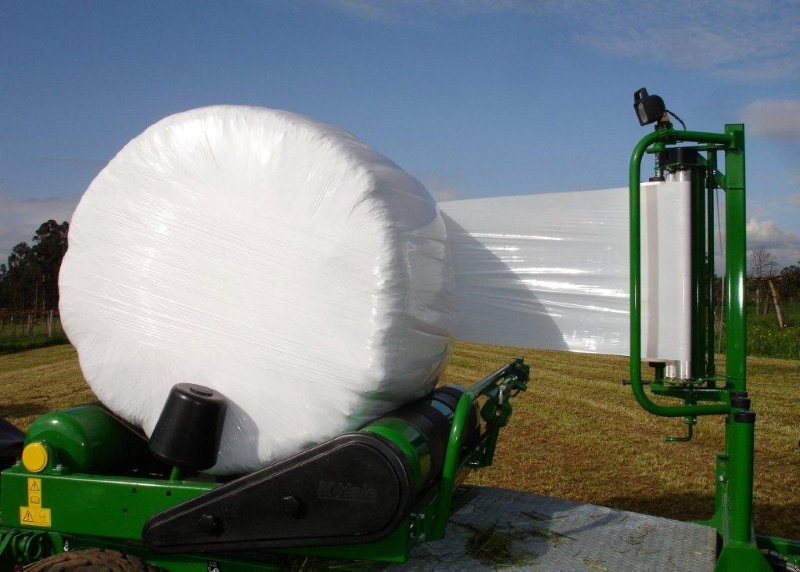
Bale silage stretch film with advanced multi-layer technology offers numerous advantages, including enhanced durability, heat and UV protection, airtight sealing, and significant cost savings. It’s a powerful tool for farmers looking to improve feed preservation and storage efficiency, ensuring their silage remains fresh and protected in any climate.
Bale silage stretch film is carefully manufactured using advanced processes and high-quality materials. The production begins with the selection of specialized polyethylene resins, chosen for their superior strength, flexibility, and durability. These resins are then mixed and extruded through a multi-layer process. The film layers are combined to create a robust, protective barrier that provides excellent adhesion, puncture resistance, and low permeability to water and oxygen. The extrusion process is managed by state-of-the-art machinery, ensuring consistent thickness and quality throughout each roll. The result is a high-performance silage stretch film that maintains the integrity of the bale and protects it from environmental stressors such as moisture, UV rays, and pests. This meticulous manufacturing process ensures the film offers maximum protection for silage during storage, preventing spoilage and maintaining its nutritional value.
Bale silage stretch film is essential for the preservation and protection of silage, a key livestock feed made from fermented grasses. Once wrapped around bales of silage, the film forms an airtight seal, significantly reducing oxygen and water permeability, which are major contributors to spoilage. The high puncture resistance of the film helps to keep the bales intact and protected from external damage, even in harsh weather conditions. Additionally, the film’s excellent adhesion ensures that the wrap stays securely in place throughout the storage period. This makes bale silage stretch film ideal for use in agricultural settings, particularly for wrapping bales of silage, hay, and straw. By keeping the bales tightly sealed, the film helps maintain the feed’s freshness, reducing spoilage caused by mold, pests, and bacteria, ultimately ensuring the quality and longevity of the stored silage. The film’s high load retention also ensures that the bale shape remains intact for the entire storage life, providing maximum efficiency for farmers.
The manufacturing and application of bale silage stretch film play a critical role in preserving the quality of silage. With advanced manufacturing techniques and excellent protective qualities, this film ensures the longevity and nutritional value of silage, helping farmers maintain high-quality feed for their livestock.
Silage stretch film is a specialized plastic film designed for wrapping and preserving silage bales. Its primary function is to create an airtight seal around the bale, which helps maintain the forage’s nutritional quality during storage. By keeping oxygen out, silage stretch film promotes anaerobic fermentation, a process that preserves the silage and prevents spoilage. The film is made from durable materials, often with UV protection, to withstand exposure to sunlight and harsh outdoor conditions. It is stretchable, making it easy to wrap tightly around bales, ensuring an even and secure fit. Products like PWP Stretch Film offer high tear resistance, moisture protection, and enhanced cling properties, making it an essential tool for farmers looking to store and preserve silage effectively. The use of silage stretch film reduces spoilage, preserves the quality of feed, and ensures that livestock have access to nutritious forage year-round.
To maintain the highest quality silage, it’s crucial to wrap the bales as soon as possible after baling. Ideally, silage bales should be wrapped within 24 hours of baling to prevent spoilage and ensure optimal fermentation. The sooner the bales are wrapped, the less chance there is for oxygen to penetrate, which could cause mold and spoilage. Waiting too long to wrap bales can lead to a decline in the forage’s nutritional value, increasing the risk of spoilage due to excess air exposure. Studies suggest that bales should be wrapped in at least 6-8 layers of film for maximum protection. By wrapping the bales promptly, farmers can prevent the growth of harmful microbes and maintain the quality of the forage for their livestock. Wrapping silage quickly also minimizes dry matter losses, ensuring a better feed yield.
Silage bales are typically wrapped in a plastic film known as silage stretch film. This film is designed to stretch tightly around the bale, forming a secure, airtight seal. The wrapping process ensures that the forage inside the bale is protected from oxygen, moisture, and other environmental factors that could lead to spoilage. Silage stretch film, such as PWP Stretch Film, is often equipped with UV protection, which helps prevent the film from degrading in sunlight, making it suitable for outdoor storage. The film also has excellent tear resistance and flexibility, allowing it to withstand the stresses of transportation and handling. Silage stretch film is preferred over other materials because of its ability to maintain the bale’s quality during long-term storage. It preserves the nutritional value of the forage by promoting anaerobic fermentation, ensuring that livestock have access to high-quality feed.
The cost to wrap a bale of silage can vary depending on several factors, including the type of silage stretch film used, the number of layers applied, and the size of the bale. On average, the cost to wrap a standard bale typically ranges from $2 to $5 per bale when using high-quality silage stretch film like PWP Stretch Film. Thicker films and those with added features such as UV protection or extra tear resistance may be priced higher but offer enhanced durability and longer-lasting protection. Additionally, the number of layers used for wrapping can influence the cost; wrapping with six layers of film is standard, but some farmers opt for eight layers for better protection, which increases the overall expense. Bulk purchasing of film can also impact the price, with many suppliers offering discounts for larger orders, thereby reducing the cost per bale.
Making silage film, specifically bale silage stretch film, involves the extrusion process where plastic resins, such as polyethylene, are melted and formed into a film. The film is stretched and cooled to create the desired thickness and elasticity. To enhance its performance, additives are often mixed with the plastic during production to improve its tear resistance, UV stability, and stretchability. Once produced, the film is wound onto large rolls, ready for use in agriculture. The thickness of the silage film can vary based on the application, but it is generally designed to offer high puncture resistance, durability, and airtight sealing, essential for preserving silage quality during storage. Manufacturers can also adjust the film’s stretchability and cling properties based on the requirements of specific farming operations, ensuring a perfect fit for various bale sizes and storage conditions.
The number of bales a roll of bale silage stretch film will cover depends on both the size of the bales and the film’s thickness. Typically, a standard 750mm (30-inch) wide roll of silage film can wrap approximately 40 to 50 bales of round silage bales with average diameters of 4 to 5 feet. However, this can vary depending on how many layers of wrap are applied to each bale. Some farmers apply up to 6-8 layers to ensure the bale is completely sealed for optimal preservation, which may reduce the number of bales covered by a single roll. Additionally, the stretchability of the film influences how much area is covered. A higher stretch rate will mean more bales wrapped per roll, as the film can cover a larger surface area when applied.
Wrapping bales of hay in plastic, specifically using bale silage stretch film, offers numerous benefits that help preserve the quality of the hay and increase its storage life. The plastic wrap forms an airtight seal around the hay, protecting it from exposure to air, moisture, and contaminants that can lead to mold growth and spoilage. The wrap also helps maintain the nutritional value of the hay by preventing the loss of proteins and sugars due to oxygen exposure. Additionally, plastic wrapping is an effective barrier against weather conditions, such as rain or humidity, that could cause hay to deteriorate. The use of silage film for wrapping bales also prevents the loss of leaves and dust during handling and storage. Overall, wrapping bales in plastic is a cost-effective method to ensure hay remains fresh, nutrient-rich, and protected for feeding livestock during the winter months.
Wrapping hay that has been rained on is not ideal, but it is still possible, provided certain precautions are taken. When hay gets wet, it absorbs moisture, which can lead to mold and spoilage if not managed properly. Wrapping wet hay with bale silage stretch film can trap moisture inside the bale, creating conditions that accelerate deterioration. However, if the hay has not been excessively wet and is allowed to dry partially before wrapping, it can still be preserved reasonably well. Ideally, hay should be wrapped when it is dry or slightly damp, but not wet. To ensure the best preservation, always assess the moisture content of the hay before wrapping. If wrapping wet hay is necessary due to weather conditions, try to use a high-quality, tear-resistant film with better sealing properties to minimize the risk of moisture buildup inside the bale.
The shelf life of baled silage, when properly wrapped with bale silage stretch film, can range from 6 months to over a year depending on the storage conditions. The plastic film creates an airtight seal that prevents oxygen from entering the bale, which is crucial for maintaining the fermentation process that preserves the silage. As long as the film remains intact and the bales are stored in a cool, dry environment, the silage can last through the winter months and into the next growing season. However, once the film begins to degrade or if the bales are punctured, the silage will spoil more quickly. The addition of UV protection to the film helps prevent degradation caused by sunlight exposure, prolonging the shelf life of the silage. It is essential to inspect bales periodically to ensure the integrity of the wrapping.
The number of wraps on silage bales depends on factors such as bale size, weather conditions, and the quality of the bale silage stretch film. Typically, 4 to 6 layers of silage film are applied around each bale to create an airtight seal and ensure proper preservation. However, for optimal protection, especially in humid or rainy climates, farmers may apply up to 8 layers. The more layers of film used, the better the protection against moisture, mold, and spoilage. Thicker layers also provide additional strength and puncture resistance, particularly for large or heavy bales. Some advanced wrapping machines are designed to stretch the film during application, allowing farmers to use fewer layers while still achieving an airtight seal. The number of wraps can also vary depending on the specific requirements of the farm and the type of crop being stored.

My name is James Thompson, and I’m the editor of this website dedicated to Stretch Film, Pallet Wrap, and Stretch Wrap products.
My passion for packaging began when I noticed the challenges companies face in securing their products efficiently for transportation and storage. This inspired me to delve deep into the world of stretch films and pallet wraps, exploring the latest technologies and best practices.
I aim to provide valuable insights, practical tips, and up-to-date industry trends to assist you in making informed decisions. Whether you’re a small business owner or part of a large corporation, my goal is to support you in optimizing your operations and ensuring your products reach their destination safely.
Thank you for visiting, and I look forward to accompanying you on your journey toward better packaging solutions.
Comments are closed